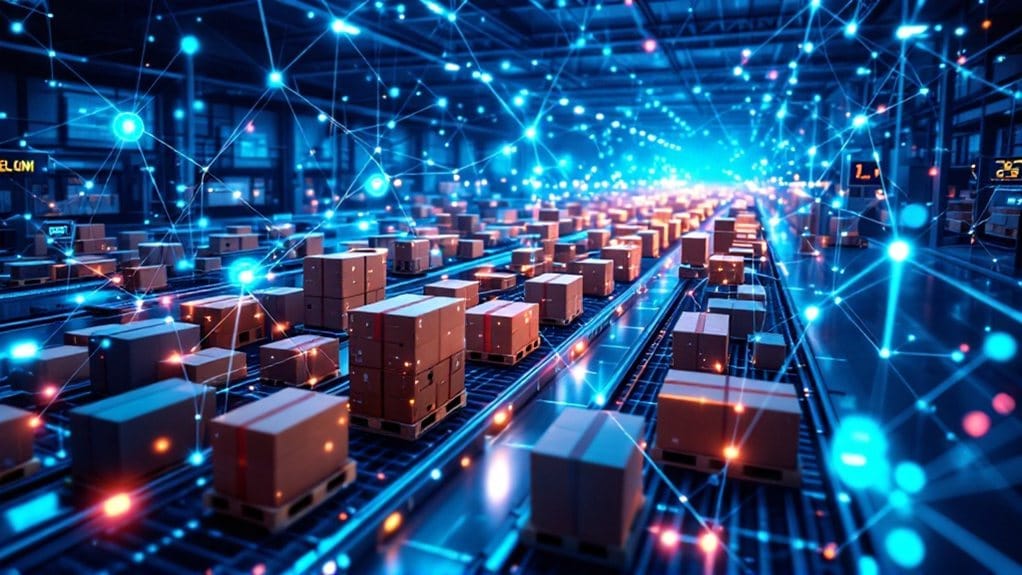Blockchain technology transforms supply chain management through five key applications: automotive manufacturing tracking, farm-to-table food tracing, IoT sensor integration, anti-counterfeiting measures, and regulatory compliance systems. Major companies like Tesla utilize blockchain for raw material sourcing, while retailers implement it for produce tracking and quality assurance. With market growth projected to reach $9.77 billion by 2030, blockchain’s integration with IoT sensors and smart contracts offers unprecedented operational efficiencies. These innovations represent just the beginning of blockchain’s transformative potential in global supply chains.

The digital transformation sweeping through global supply chains has found its cornerstone in blockchain technology, a decentralized ledger system that promises to innovate how businesses track, manage, and verify their operations. Through improved transparency and real-time tracking capabilities, blockchain enables organizations to monitor goods throughout their pathway, utilizing IoT sensors and RFID technology to collect and verify important data points at every step of the process. The technology ensures regulatory compliance through immutable record-keeping.
Blockchain revolutionizes supply chain management by creating transparent, traceable networks that leverage IoT technology to monitor goods with unprecedented precision.
In the automotive industry, manufacturers like Tesla have implemented blockchain solutions to track raw material sourcing and guarantee sustainability compliance, while simultaneously managing inventory levels across their complex global networks. Smart contracts automate transactions between suppliers and manufacturers, reducing administrative overhead and minimizing the risk of human error in procurement processes, ultimately leading to significant cost savings and improved operational efficiency. The technology is experiencing rapid growth, with the blockchain supply chain market expected to reach 9.77 billion dollars by 2030.
The food industry has witnessed particularly impactful applications of blockchain technology, where farm-to-table traceability has become fundamental for food safety and quality assurance. Major retailers have implemented blockchain systems that can trace produce from their origin to store shelves within moments, dramatically improving recall efficiency and reducing food waste through better inventory management and quality control measures. The integration of digital assets into these systems has enhanced transaction efficiency and reduced costs across the supply chain.
The integration of blockchain with IoT devices has created powerful synergies in supply chain management, enabling real-time monitoring of environmental conditions critical for sensitive goods. Smart sensors continuously track temperature, humidity, and other significant parameters, automatically triggering alerts when conditions deviate from acceptable ranges, thereby guaranteeing product integrity throughout transportation and storage.
Blockchain’s ability to prevent counterfeiting has made it particularly valuable in luxury goods supply chains, where authenticity verification is paramount. By creating immutable records of product origins and movements, manufacturers can provide customers with verified proof of authenticity, while simultaneously gathering valuable data on product lifecycles and market dynamics.
This improved traceability, combined with automated settlement systems and smart contracts, has established blockchain as a fundamental tool for modern supply chain optimization, delivering both operational efficiencies and enhanced stakeholder trust.
FAQs
How Much Does It Cost to Implement Blockchain in a Supply Chain?
The implementation cost of blockchain in supply chains varies greatly based on complexity and scale. An MVP (Minimum Viable Product) typically ranges from $80,000 to $150,000, while extensive solutions can cost between $400,000 and $1.5 million.
Additional expenses include infrastructure setup, security measures, integration with existing systems, ongoing maintenance, and employee training.
Transaction fees differ between public and private blockchains, with customization needs further influencing total costs.
What Cybersecurity Risks Are Associated With Blockchain Supply Chain Systems?
Blockchain supply chain systems face several critical cybersecurity risks.
Primary concerns include privacy vulnerabilities due to public access to network nodes, potential 51% attacks where malicious actors gain network control, and smart contract code exploitation.
Additional risks involve private key management, where loss or theft can result in permanent asset loss, and physical device security concerns.
These systems also struggle with regulatory compliance due to data immutability and varying global frameworks.
Can Small Businesses Benefit From Blockchain Supply Chain Solutions?
Small businesses can derive significant benefits from blockchain supply chain solutions through cost reduction and improved operational efficiency.
The technology enables direct supplier relationships, eliminates intermediary fees, and automates inventory management processes.
While initial implementation costs pose challenges, cloud-based blockchain solutions and consortium partnerships make the technology more accessible.
The system’s transparency also helps small businesses build trust with customers and comply with regulatory requirements.
How Long Does It Take to Transition to a Blockchain-Based Supply Chain?
The shift to a blockchain-based supply chain typically spans 12-24 months, varying based on organizational complexity and scale.
Initial pilot programs usually take 3-6 months, while full implementation requires extensive planning, stakeholder coordination, and technical integration.
Companies must account for system migration, employee training, and partner onboarding phases, with larger enterprises requiring longer shift periods due to complex legacy systems and multiple stakeholder involvement.
Which Industries Have the Highest Success Rates With Blockchain Implementation?
Several industries demonstrate particularly high success rates in blockchain implementation, with cryptocurrency and financial services leading due to their natural alignment with blockchain technology.
Supply chain management follows closely, as evidenced by Maersk’s TradeLens platform, which has improved cargo tracking efficiency by 40%.
Healthcare and real estate sectors have also achieved significant wins, especially in data security and property transaction transparency, while energy trading platforms show promising adoption rates.









